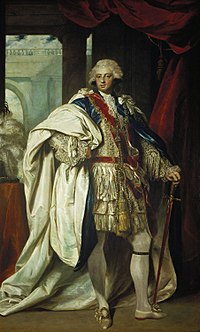Prince Frederick Augustus, Duke of York and Albany
| Prince Frederick | |||||
|---|---|---|---|---|---|
| Duke of York and Albany | |||||

The Duke of York, painted by Sir Joshua Reynolds in the robes of the Order of the Garter, 1788.
|
|||||
| Born |
16 August 1763 St. James's Palace, London |
||||
| Died | 5 January 1827 (aged 63) Rutland House, London |
||||
| Burial | St. George's Chapel, Windsor | ||||
| Spouse | Princess Frederica Charlotte of Prussia | ||||
|
|||||
| House | Hanover | ||||
| Father | George III | ||||
| Mother | Charlotte of Mecklenburg-Strelitz | ||||
| Full name | |
|---|---|
| Frederick Augustus |
The Prince Frederick, Duke of York and Albany KG GMB GCH (Frederick Augustus; 16 August 1763 – 5 January 1827), a member of the House of Hanover, was the second son and child of King George III, King of Great Britain and Ireland and Elector of Hanover. A soldier by profession, from 1764 to 1803 he was Prince-Bishop of Osnabrück, and from the death of his father in 1820 until his own death in 1827 he was the heir presumptive to his elder brother, King George IV, both to the United Kingdom of Great Britain and Ireland and the Kingdom of Hanover. However, he died before his brother.
Frederick was thrust into the British Army at a very early age and was appointed to high command at the age of thirty, when he was given command of a notoriously ineffectual campaign during the War of the First Coalition, a continental war following the French Revolution. Later, as Commander-in-Chief during the Napoleonic Wars, he oversaw the reorganisation of the British Army, putting in place vital structural, administrative and recruiting reforms for which he is credited with having done "more for the army than any one man has done for it in the whole of its history."
Prince Frederick Augustus, or the Duke of York as he became in later life, belonged to the House of Hanover. He was born on 16 August 1763, at St. James's Palace, London. His father was the reigning British monarch, King George III. His mother was Queen Charlotte (née Princess of Mecklenburg-Strelitz). He was christened on 14 September 1763 at St James's, by the Archbishop of Canterbury, Thomas Secker — his godparents were his great-uncle the Duke of Saxe-Gotha-Altenburg (for whom the Earl Gower, Lord Chamberlain, stood proxy), his uncle the Duke of York (for whom the Earl of Huntingdon, Groom of the Stool, stood proxy) and his great-aunt the Princess Amelia.
...
Wikipedia
